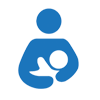1. What do Peer Supporters do?
Peer Supporters are trained to provide support on the normal course of breastfeeding and infant feeding, to families in a non-judgemental manner. Peer Supporters provide support in a range of ways; they can visit families in their home, provide support over phone, text or email, answer one-off questions, run drop-in groups or meet up over coffee etc. They are happy to provide support in ways that best suit you and your family.
2. Have all Peer Supporters breastfed?
Most of the Peer Supporters have breastfed but not all, for example, we have a dad Peer Supporter or maybe it has been with their second child, so they are all empathetic with the challenges you may face. They are all passionate about breastfeeding and have all completed the same training.
3. Can I contact a Peer Supporter if I am not breastfeeding?
Yes. Peer Supporters will support you and your family/whanau no matter what your feeding choice is.
4. How much does it cost to have support from a Peer Supporter?
It doesn’t cost anything. Thanks to our wonderful Peer Support volunteers!
5. Do Peer Supporters undergo any training?
Peer Supporters have graduated from a programme based on La Leche League New Zealand’s Peer Counsellor Programme and have completed approximately 30 hours of breastfeeding education provided by our programme Peer Support Administrators. Some Peer Supporters also choose to take part in an Annual Accreditation process with means they have undertaken extra education and development about breastfeeding in the last year.
6. Are Peer Supporters medically qualified?
The Peer Supporter Training is not a medical qualification, however they receive approximately 30 hours of breastfeeding education. If they are unable to help Peer Supporters will be able to help you to find further assistance and are aware of all the local options available for professional help.
7. Can I contact a Peer Supporter if I am still seeing my midwife, Plunket nurse or GP?
Yes, definitely! You can contact a Peer Supporter while seeing other health professionals. Peer Supporters can support you alongside other health professionals.
8. When is a good time to contact a Peer Supporter?
Anytime! Mothers, fathers, extended family members and friends can call, txt, email or ask to be visited by a Peer Supporter during pregnancy, after birth, when returning to work, during the weaning stages, or even if you have a one-off question.
9. What if I don’t get on with the Peer Supporter I talk to?
We have lots Peer Supporters available, all from different walks of life and from different age groups. No-one will be upset if you would prefer to talk to another Peer Supporter, we all know we connect differently with different people.
10. I’m a new Dad, where can I get support?
Dads and all other family members play a very important role in supporting breastfeeding, Peer Supporters are happy to give assistance to all family members. We have one Dad Peer Supporter in Queenstown who can provide “Dad-to-Dad” support. For more Breastfeeding information for Dad’s please click here.
11. Who do Peer Supporters work for?
Peer Supporters are volunteers. They are supported by Peer Supporter Administrators who are funded by WellSouth Primary Health Network.
12. What information is recorded about me?
Peer Supporters report on the number of times they talk to you. No personal details are reported or discussed with anybody else. However, a Peer Supporter may share personal details with a Peer Supporter Administrator or other health professional if they need help with an issue. This is only ever done with your agreement.

